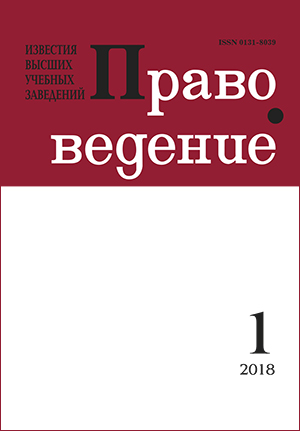Alf Ross on the concept of law and legal validity: the realistic approach
DOI:
https://doi.org/10.21638/11701/spbu25.2018.105Abstract
Alf Ross is one of the most prominent representatives of Scandinavian legal realism and one of the main participants of the discussion on legal validity. This article explores the main points of his realistic legal concept. Ross uses a unique mixture of the main tenets of logical positivism and the Uppsala school of philosophy to suggest a new project of theoretical legal science, which implies, among other things, that its key element is specific legal “validity” — in interrelation with legal “effectiveness” — and not the concept of law. This brings the author to the necessity of a rather thorough linguistic inquiry of various Russian, English, Danish, etc. terms related to the concept of validity, which leads to the conclusion that correct Russian translation of Ross’s terms “gyldighet” and “gælden” is “dejstvitel’nost’” and “dejstvennost’”, respectively. Together with the analysis of Ross’s ideas about the province and proper methodology of jurisprudence this allows the author to fully and accurately reconstruct such aspects of Ross’s legal theory as content and role of the concept of law as well as realistic concept of legal validity. The author argues that specific interrelation between “validity” and “effectiveness” — and its underlying principles — is also a key to understanding the whole Ross’s concept of new realistic jurisprudence, which encompass a differentiation between legal knowledge and legal politics, an empirical approach to legal cognition, reducing the gap between legal theory and practice. Other topics, specifically addressed in this article, are Hart — Ross critical exchange and Ross as a legal realist.
Keywords:
legal validity, validity of law, legal effectiveness, concept of law, Alf Ross, Scandinavian legal realism, binding force, normativity of law
Downloads
References
p.
Downloads
Published
How to Cite
Issue
Section
License
Articles of "Pravovedenie" are open access distributed under the terms of the License Agreement with Saint Petersburg State University, which permits to the authors unrestricted distribution and self-archiving free of charge.




